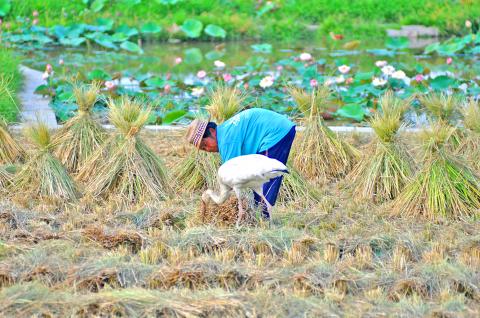The New Taipei City Government has canceled a proposed photography contest focused on a rare Siberian white crane that migrated to a wetland in the city late last year amid criticism the contest could threaten the bird’s habitat with the influx of competitors and tourists.
The contest was promoted on the city’s Animal Protection and Health Inspection Office Web site to raise awareness of bird conservation and the rarity of the white crane — an endangered species — but the office canceled the contest due to conservation concerns, office director Chen Yuan-chuan (陳淵泉) said.
The office has deployed a security guard to maintain order at the site, cordoned off the rice paddies where the bird dwells and set up warning signs to caution the public against getting too close to the bird, Chen said.

Photo: Yu Chao-fu, Taipei Times
Taiwan Ecological Engineering Development Foundation deputy executive Chiu Ming-yuan (邱銘源), who established a conservation team to protect the white crane and document its daily activities and growth, said humans are the most dangerous threat to the crane.
The white crane has survived several human intrusions, including a television crew that was shooting a gunfight scene using camera-equipped drones, photographers breaking into the paddies to capture the bird and tourists teasing the crane with a slipper, Chiu said.
He said that although the office might have launched the contest out of goodwill, but it had misunderstood its duty to protect the bird, while encouraging more tourists at a time when the on-site guard and environmentalists were already overwhelmed with misbehaving visitors.
Saying that the office had claimed that it could not afford to keep a guard at the scene any longer than next month, Chiu asked how the office had the money to hold the contest.
A birdwatcher surnamed Lai (賴) said any such activity that did not contribute to ecological education is a waste of money and could lead to misconceptions about conservation.
Chen said that it only costs NT$30,000 to hold the contest, which is defined as an administrative expense, while hiring a security guard is a personnel expense.
However, the office has managed to hire a security guard until Sept. 15, Chen said.

‘DENIAL DEFENSE’: The US would increase its military presence with uncrewed ships, and submarines, while boosting defense in the Indo-Pacific, a Pete Hegseth memo said The US is reorienting its military strategy to focus primarily on deterring a potential Chinese invasion of Taiwan, a memo signed by US Secretary of Defense Pete Hegseth showed. The memo also called on Taiwan to increase its defense spending. The document, known as the “Interim National Defense Strategic Guidance,” was distributed this month and detailed the national defense plans of US President Donald Trump’s administration, an article in the Washington Post said on Saturday. It outlines how the US can prepare for a potential war with China and defend itself from threats in the “near abroad,” including Greenland and the Panama

A magnitude 4.9 earthquake struck off Tainan at 11:47am today, the Central Weather Administration (CWA) said. The hypocenter was 32.3km northeast of Tainan City Hall at a depth of 7.3km, CWA data showed. The intensity of the quake, which gauges the actual effect of a seismic event, measured 4 in Tainan and Chiayi County on Taiwan's seven-tier intensity scale, the data showed. The quake had an intensity of 3 in Chiayi City and County, and Yunlin County, while it was measured as 2 in Kaohsiung, Nantou County, Changhua County, Taitung County and offshore Penghu County, the data showed. There were no immediate reports of

The Chinese Nationalist Party (KMT) is maintaining close ties with Beijing, the Democratic Progressive Party (DPP) said yesterday, hours after a new round of Chinese military drills in the Taiwan Strait began. Political parties in a democracy have a responsibility to be loyal to the nation and defend its sovereignty, DPP spokesman Justin Wu (吳崢) told a news conference in Taipei. His comments came hours after Beijing announced via Chinese state media that the Chinese People’s Liberation Army’s Eastern Theater Command was holding large-scale drills simulating a multi-pronged attack on Taiwan. Contrary to the KMT’s claims that it is staunchly anti-communist, KMT Deputy

RESPONSE: The government would investigate incidents of Taiwanese entertainers in China promoting CCP propaganda online in contravention of the law, the source said Taiwanese entertainers living in China who are found to have contravened cross-strait regulations or collaborated with the Chinese Communist Party (CCP) could be subject to fines, a source said on Sunday. Several Taiwanese entertainers have posted on the social media platform Sina Weibo saying that Taiwan “must be returned” to China, and sharing news articles from Chinese state media. In response, the Mainland Affairs Council (MAC) has asked the Ministry of Culture to investigate whether the entertainers had contravened any laws, and asked for them to be questioned upon their return to Taiwan, an official familiar with the matter said. To curb repeated